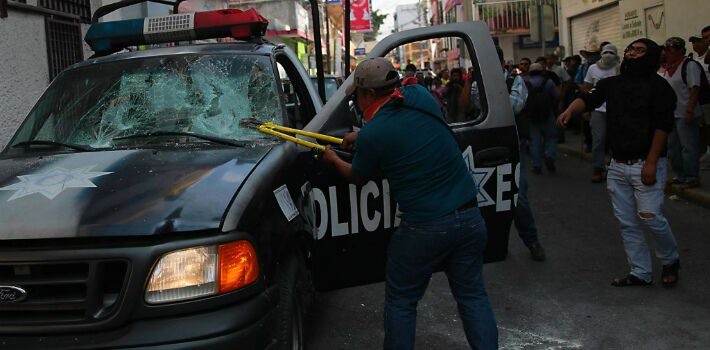
EspañolRampant violence in the Mexican state of Guerrero is taking its toll, as everyday more and more companies are packing it up and taking their business elsewhere.
In the town of Iguala, the infamous site of the forced disappearance of 43 student teachers last year and several other violent episodes, companies such as German automaker Volkswagen, Coca-Cola, and cement manufacturer Canteras de México are among the latest to move their operations to other locations.
FEMSA, the largest franchise Coca-Cola bottler in the world, shut down its distribution center in Iguala and Arcelia on May 20. The company announced it will outsource the distribution center’s operations, but will maintain its facilities in other parts of the state.
The Coca-Cola bottler has not publicly commented on the reasons for its decision to move from Iguala, but its 2014 annual report warned that rising drug-cartel violence could harm their business.
“Insecurity in Mexico could increase, and this could negatively impact our earnings. The violence between drug cartels, and between them and the armed forces that seek to enforce the law, could represent a risk to our business,” the FEMSA report states.
Earlier this year, members of a local teachers union kidnapped two FEMSA employees and demanded the release of three of their colleagues, who police had arrested for looting a Coca-Cola truck. After the incident, FEMSA closed its distribution center in Chilpancingo, Guerrero, and sacked 600 employees.
Zacarías Rodríguez Cabrera, head of Mexico’s National Chamber of Trade, Services, and Tourism, says the fact that important companies are now leaving Iguala represents a “grave issue.” He confirmed that Spanish automaker Seat has joined Volkswagen in closing their offices in the city.
Coca-Cola se convirtió en una víctima más de la inseguridad en Guerrero http://t.co/O1MDJaCRXD pic.twitter.com/9eMh8YKwo9
— MT_enMEXICO (@MT_enMEXICO) June 25, 2015
“Coca-Cola becomes another victim to the insecurity in Guerrero.”
Furthermore, 10 percent of the 400 businesses registered with the Chamber have ceased their operations, Rodríguez Cabrera added.
“Since the events of the September 26 and 27 of 2014, we have not been able to recover the trust of our citizens, consumers, or neighbors to come buy in Iguala. There is a certain distrust that still exists.”
However, the official numbers provided by the Mexican government show that foreign direct investment (FDI) reached US$7.5 billion during the first quarter of 2015, an increase of 30 percent compared to the same period of the previous year. The data also suggests much of it came from reinvested earnings, rather than new investments.
Other businesses, such as the Belgium-based mining company Nyrstar NV, have also decided to close their facilities in Guerrero due to “security issues in the region.”
“It’s a mine with a lot of potential located in a complicated part of Guerrero,” Economy Minister Idelfonso Guajardo Villareal said about the reserve that employed 380 workers. “They were investing at a very high pace, some $200 million per quarter, to begin extracting the minerals, and worked closely with the community. The managers tried to maintain the investment.”
In the last quarter of 2014, around “50 percent of the companies in Acapulco, Guerrero, closed their doors,” according to a report by local news outlet Revolución 3.0.
PepsiCo Manager Kidnapped
On Wednesday, June 24, unidentified gunmen kidnapped PepsiCo regional manager Hugo de la Cruz in the city of Teloloapan, in yet another example of the violence that persists in Guerrero. De la Cruz was reportedly taken from a company car with his chauffeur, who was later released and alerted the authorities.
Fernando Meléndez Cortez, president of the business association COPARMEX in Chilpancingo, says he regrets the violence his state is currently living through. He says that in Acapulco and Chilpancingo alone, 270 businesses have been forced to close, worsening the economic situation of already one of the poorest states in Mexico.
 Versión Español
Versión Español












